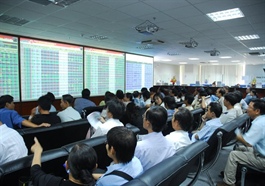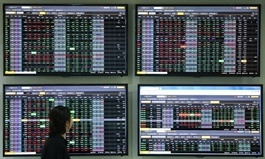Amid favorable conditions, bank listings on the rise
Amid favorable conditions, bank listings on the rise
In the context of favorable conditions on the stock market which saw the indices rising sharply over the past eight months, getting listed at the moment will give banks better valuation and make it easier for them to attract greater cash flows, especially when bank stocks are now a powerful magnet constantly in the spotlight.
Maritime Commercial Joint Stock Bank (MSB) has become the 20th bank to list on a stock exchange and the 13th active on the Hochiminh Stock Exchange
|
Maritime Commercial Joint Stock Bank (MSB) started trading more than 1.17 billion shares officially on the HOSE on December 23, 2020 at the reference price of VND15,000 each, making them the 20th bank to list on a stock exchange and the 13th active on the southern HCMC Stock Exchange. Reportedly, after their listing, MSB will proceed with a plan to offer 82.5 million treasury shares to their current shareholders.
One day after MSB, 300 million shares of Petrolimex Group Commercial Joint Stock Bank (PGBank) were officially available on the UPCoM, at the reference price of VND15,500 each on the first trading day. That means after their intended merger with VietinBank had fallen through and the plan to become one with HDBank had failed to make considerable progress, PGBank went public in search of more opportunities to facilitate its capital mobilization plans more easily.
Meanwhile, An Binh Commercial Joint Stock Bank has recently been granted a certificate of securities registration by the Vietnam Securities Depository (VSD) with the stock code ABB. It seeks to take more than 571.3 million shares to the UPCoM in the coming time. Meanwhile, Southeast Asia Commercial Joint Stock Bank (SeABank) has finalized the list of shareholders and submitted the application to offer nearly 1.2 billion shares on the HOSE. Likewise, Orient Commercial Joint Stock Bank (OCB) also built a plan to list on the southern bourse in end-2020.
Towards the end of 2020, the fact that banks rushed to list on the stock exchange was accelerating. Earlier, Viet Capital Bank (BVB) made their stock market debut on July 9, followed by Nam A Bank (NAB) on October 9 and Saigon Bank for Industry and Trade (SGB) on October 15, all choosing the UPCoM for their initial transactions. In 2019, Vietbank was the only entity to list successfully, the number of banks active in the stock market in 2020 was much larger.
In addition, banks’ switch of listing exchange has been on the rise recently and has also been a positive catalyst for stock prices. For example, Asia Commercial Joint Stock Bank (ACB) has just moved from the HNX to the HOSE, VIB and LienVietPostBank from the UPCoM to the HOSE, whereas SHB and NAB are looking to change to the HOSE soon so that their capital mobilization plans can be carried out more smoothly.
Better valuation in favorable conditions
Both the strategy for the development of the banking industry of Vietnam until 2025, with a vision to 2030, approved by the Prime Minister in August 2018, and the project to restructure the stock market and the insurance market until 2020, with a vision to 2025, ratified in late February 2019, require shares of all commercial joint stock banks to be listed on a stock exchange by 2020. Given that deadline, it is understandable why many banks were rushing to list on the stock market on the last days of the year.
More importantly, in the context of favorable conditions on the stock market which saw the indices rising sharply over the past eight months, getting listed at the moment will give banks better valuation and make it easier for them to attract greater cash flows, especially when bank stocks are now a powerful magnet constantly in the spotlight.
Statistics show that banking is among the industries posting the highest growth rates and their highly-valuable stocks have formed a group that is leading the market to a new high. The fact that a series of banks have recently listed on the stock market with a relatively high reference price forces the market to change their point of view and re-evaluate the shares of those already listed for a long time.
 |
For instance, when being listed, small banks such as BVB, NAB, and SGB set the reference price at around VND15,000 per share, equivalent to the trading price at that time of MBBank—a bank with a much larger scale and greater business efficiency—a move unacceptable by MBBank's shareholders. In reality, the stock price of MBBank has since then steadily gone up and is now standing at VND23,000 per share. Similarly, HDBank, VPBank, VIB and Techcombank all made a major breakthrough in the same period.
As their business has been constantly brisk so far despite the impact of Covid-19, banks are in the best time to capture attention when they get listed. Take MSB for example. Before its official listing date, this bank said their 11-month accumulated pre-tax profit had reached more than VND2.3 trillion, 60% above their target for this year and up 116% year-on-year.
Moreover, MSB said they would sign an exclusive insurance distribution contract in the first quarter of 2021, and then probably completely divest from FCCOM, a financial company. These positive pieces of information could be an important catalyst for MSB to attract investors when they go public. When taking into account the fact that ACB's exclusive bancassurance contract with Sun Life Insurance Company Limited and VPBank's departure from FE Credit has resulted in a sharp increase in their stock prices recently, investors are holding high expectations for the upcoming IPO of MSB.
Last but not least, banking remained the leading sector in terms of profit growth in the first nine months of 2020. JP Morgan maintained their view of high growth for Vietnamese banks in a recent report, saying that Vietnamese banks were their favorite in the region. This financial institution also forecasts the earnings per share (EPS) and target price of Vietnamese banks will go up, expecting their asset quality will remain stable in the next two years.
Regarding bad debts due to the impact of Covid-19, Vietcombank Securities Company believes that even when Circular 01/2020/TT-NHNN expires, the percentage of restructured loans turning into bad debts will be small, as many borrowers have seen recovery in their production and business activities. Since Vietnam’s economy has recently improved, a group of borrowers who have undergone restructuring in accordance with Circular 01 now regain cash flows and start paying interest again after they received some extension in the second quarter.

































